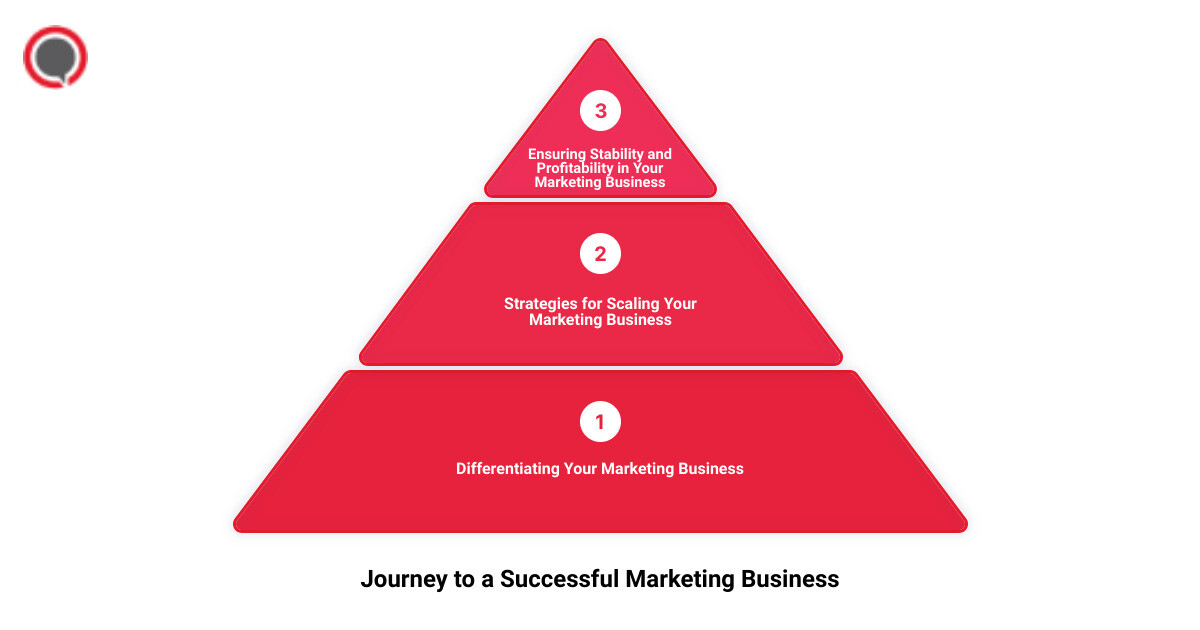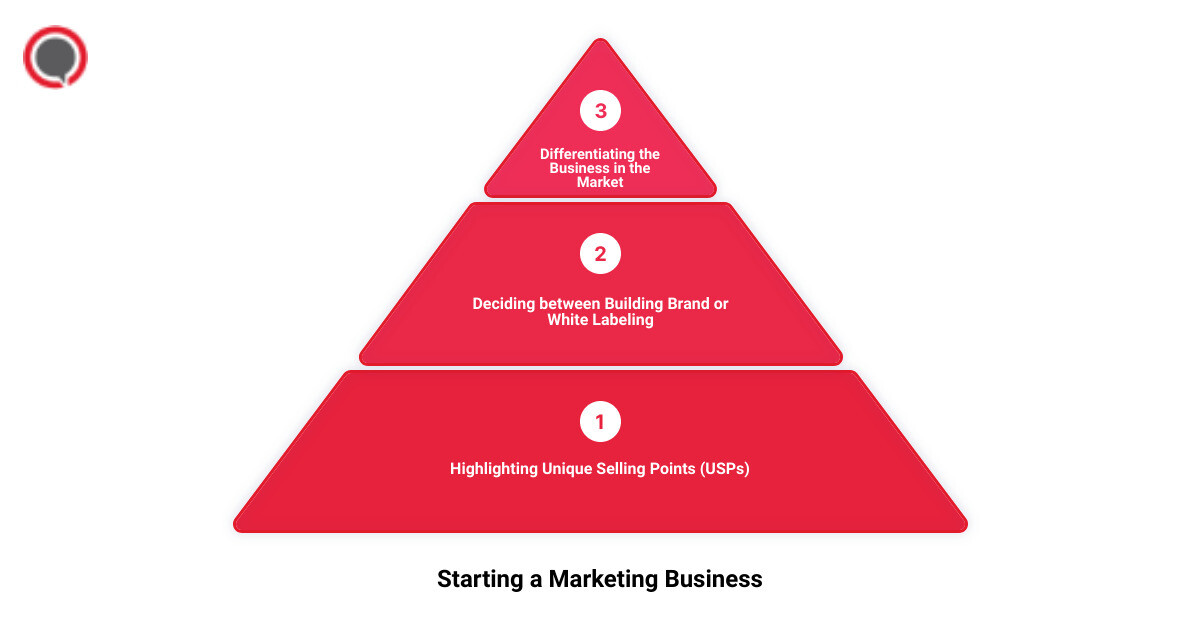To flex your creative muscle, to witness a brand’s growth from the ground up, and to ride the wave of digital transformations - all these make the idea of starting a marketing business an exciting venture. However, the journey of launching and establishing a marketing business can be far from straightforward. With projections indicating a constantly evolving digital landscape and intensifying competition, it can seem overwhelming. But, fret not! Whether you're wondering about starting a marketing business with no experience or detail-oriented planning is your strength, at SocialSellinator, we've distilled our expertise for you, aspiring entrepreneurs and marketers.
As a beginner, the task of setting up a marketing business necessitates you to understand key factors such as devising a business plan, choosing an appropriate business structure, registering your business, and more. However, the process doesn't stop there. As experienced players in the field, we understand that the key to success lies beyond the basics. You need a unique selling proposition, a niche focus, an understanding of client relationships, knowledge of billing structures, and ultimately a knack for consistent scalability while maintaining stability.
Take a sneak peek at what to expect in our upcoming sections:
- Basics of Setting Up a Marketing Business
- Building an Experience and Skill Set for Marketing
- Differentiating Your Marketing Business
- Understand Various Pricing Models for Billing Clients
- Strategies for Scaling Your Marketing Business
- Ensuring Stability and Profitability in Your Marketing Business
Now let’s ignite that spark and pave the way for your successful marketing business.

Image Description: Infographic illustrating inspirational tips for entrepreneurs, detailing success and failure statistics, benefits and challenges of breaking ground in the marketing industry, and various tips to successfully establish a marketing business.
Understanding the Basics of Starting a Marketing Business
Taking the leap and starting your own marketing business is an exciting venture. However, it's also a process that requires careful planning and execution. Let's dive into some of the fundamental steps involved in kickstarting a successful marketing business.
Importance of a Business Plan
Before anything else, you need a solid business plan. This document sets the stage for your marketing business, outlining your mission, vision, target audience, competition, marketing strategies, and financial projections. It's a roadmap to your success, guiding you in making informed decisions and helping you stay on track. Remember, as our expert at SocialSellinator would say, "A goal without a plan is just a wish."
Choosing the Right Business Structure
Next, decide on the most suitable business structure for your marketing agency. Your options include sole proprietorship, partnership, limited liability company (LLC), and S corporation. Each has its advantages and disadvantages, affecting aspects like taxation and legal responsibilities. For instance, if you're setting up shop alone, a sole proprietorship might be the easiest and most straightforward option. However, it also means you're personally liable for your business's debts and liabilities.
Determining Business Costs
Understanding your business costs is crucial in forecasting your potential profitability. Consider the cost of marketing equipment and supplies, office space (if necessary), software subscriptions, and, of course, your time. For instance, if you're offering social media marketing services, calculate how long it would take you to develop and execute a campaign. This will help you set expectations with your clients and also plan your profitability.
Naming and Registering Your Business
Coming up with a name for your business is not just about creativity; it's about availability too. Once you've found an unclaimed name that reflects your brand, register it with your state's Secretary of State office. This process usually involves filing paperwork and paying a fee. You'll also need to obtain a business license to operate your business legally within a specific location.
Opening Financial Accounts
Keeping business and personal finances separate is not just good practice; it's essential for accurate financial tracking and reporting. Opening a business bank account and credit card can help you manage your company’s expenses and income better.
Purchasing Necessary Marketing Equipment and Supplies
Depending on your business model, you may only need a computer, a smartphone, and a reliable internet connection to get started. However, if you're launching your marketing business on a larger scale, you'll need to invest in more sophisticated equipment, software, and perhaps even office space. The potential basic equipment costs for a non-home-based marketing business can start at $5,000.
Image Description: Infographic illustrating the essential equipment and tools for starting a marketing business, including a computer, smartphone, marketing software, and reliable internet connection.
When we started SocialSellinator, we made sure to invest in the necessary tools and equipment that would allow us to deliver top-tier services to our clients. We believe that having the right tools can significantly enhance productivity and results. Now, it's your turn to take the reins and kickstart your marketing business. Remember, the journey of a thousand miles begins with a single step.
Gaining Experience and Skills in Marketing
Stepping into the world of marketing can feel like stepping onto a fast-moving train. The landscape is dynamic, with trends and tools evolving rapidly. However, don't let this deter you. As experts in this field, we've found that gaining essential experience and skills in marketing is a manageable journey, one that requires dedication, time, and a growth mindset.
Working in a Marketing Team

One of the best ways to gain experience is by working as part of a marketing team. This not only exposes you to the various facets of marketing but also allows you to learn from experienced professionals. You can start by working in a digital marketing agency, where you'll learn about PPC, SEO, social media marketing, and more. As mentioned in a Reddit post, the knowledge and skills acquired from working in an agency can be invaluable. It's like attending a hands-on marketing school where you get to learn and apply concepts in real-time.
Managing Clients for Larger Agencies
Another excellent way to gain experience is by managing clients for larger agencies. This gives you a feel of the client-agency relationship, teaches you how to manage expectations, and provides insight into different business models. It's a hands-on way to learn client servicing, project management, and strategic planning, which are crucial skills when starting your marketing business.
Starting as a Contractor
Freelancing or contracting is another viable path for gaining marketing experience. It allows you to work on a variety of projects, handle different types of clients, and learn to manage your time and resources effectively. Plus, it's a great way to start building your professional network and client base, which will be invaluable when you're ready to launch your own agency.
Importance of Soft Skills and Client Relationships
While it's vital to acquire hard skills, it's equally important to develop your soft skills. Exceptional communication, problem-solving abilities, emotional intelligence, adaptability, and a positive attitude can set you apart in the marketing field.
Building solid client relationships is another crucial aspect. As ZenBusiness points out, managing multiple clients and measuring campaign effectiveness are key challenges in the marketing business. But with strong communication and analytical skills and a deep understanding of your clients' needs, you can navigate these challenges successfully.
In conclusion, gaining experience and skills in marketing involves a combination of practical experience, continuous learning, and interpersonal skills development. It's a diverse and dynamic field that offers numerous opportunities for growth and learning. Whether you choose to work in a team, manage clients for larger agencies, start as a contractor, or all of the above, each experience brings you one step closer to starting your successful marketing business.
Differentiating Your Marketing Business
Stepping into the marketing business world can be a thrilling ride, but it can also be a challenging one. Competition is fierce, and standing out from the crowd requires more than just a good business plan and marketing skills. It demands differentiation. Let's delve into the ways you can set your marketing business apart.
Focusing on a Specific Niche
Every business has a unique selling proposition (USP), and for marketing businesses, this often lies in the niche they choose to serve. Identifying your niche is a crucial first step in differentiating your marketing business. As our expert at SocialSellinator would say, "What is your expertise, and which services would you like to offer? What type of businesses do you want to work with?"

Do you want to focus on small businesses in a particular industry or geographic location? Do you want to work with local businesses only or perhaps target enterprises? As a Reddit user suggested, leveraging your previous experience in another industry can set you apart from other agencies. For instance, if you were an insurance salesman, you could focus on Digital Marketing for Insurance Agents. The more specialized your knowledge, the more attractive your services will be to potential clients.
Offering Unique Marketing Perspectives
With your niche defined, it's time to think about the unique marketing perspectives you can bring to the table. What kind of digital marketing services can you provide that will benefit your target market? Search engine optimization (SEO), pay-per-click (PPC) advertising, social media marketing, content marketing, and email marketing are just a few possibilities.
Be clear about what makes your company different, and focus on highlighting these USPs to prospective customers. Honesty is key when determining how much your product or service is worth in the marketplace. If you don't have a unique specialization to offer potential clients, then it's likely that you'll be perceived as offering low-value services.
Utilizing White Labeling
Another way to differentiate your marketing business is by considering whether you want to build your own brand or white-label your offerings. White labeling allows you to offer services under your brand name that are actually fulfilled by another company. This approach can be advantageous, especially when you're just starting out, as it will allow you to piggyback off of an established brand.

However, if you're looking to build your own brand from the ground up, then you'll need to focus on creating original content, marketing collateral, and a website that reflects your brand identity. You could even consider buying and reselling white-labeled marketing services yourself.
Differentiating your marketing business is a strategic endeavor that requires careful thought and planning. By focusing on a specific niche, offering unique marketing perspectives, and considering options like white labeling, you can carve out a unique space for your business in the competitive world of marketing.
Pricing Models for Billing Clients
One of the most critical aspects when starting a marketing business is figuring out how to bill your clients. There's no one-size-fits-all approach, as the ideal pricing model can vary depending on the nature of your services and the specific needs of your clients. Let's explore four commonly used pricing models in the marketing industry.
Hourly Billing
Hourly billing, as the name suggests, involves charging clients based on the number of hours spent on their project. This model can be advantageous if you're offering one-on-one consulting, where your time and expertise are the primary value propositions.
However, it can get tricky if you're providing more comprehensive services. The client might question the time you spent on certain tasks or worry about being overcharged. To avoid such issues, we at SocialSellinator generally recommend staying away from the hourly billing model unless it's for specific consulting services.
Flat Retainer
The flat retainer is a simple, straightforward pricing model that involves charging a fixed monthly fee for your services. You assess how much the work and time for a specific client are worth, and you both agree on a fee. This model is beneficial as it allows you to forecast your earnings and reduce friction when it comes time to send out the invoice.
However, it's important to have an agreement in your contract that guarantees the price for a certain period. This can help manage clients who scale exponentially over time. As your agency grows, you can implement a percentage of spend model on top of the retainer, making it clear that if they want to scale and spend more, it will require more work on your end.
Percentage of Spend
This model involves charging clients a percentage of their marketing spend. It's popular with mature agencies as it factors in the growth potential and scalability of the client. However, you need to be cautious if you decide to conduct business solely on a percentage of spend model. Various internal factors within businesses can dictate budget, many of which are beyond your control.
Performance-Based Billing
Performance-based billing means that you get paid when the client makes money off a sale. This approach can be tempting as it helps build trust with a client. However, unless you have a great insight into the operations end of the client’s business, it can make billing them extremely difficult. This model is typically best suited for ecommerce or clients selling things directly.
In conclusion, the pricing model that works best for your marketing business will depend on your services, your clients, and your business goals. It may take some experimentation to find what works best, but ultimately, the right pricing model can play a significant role in the success of your marketing business. At SocialSellinator, we have had success with a flat retainer model, which we feel strikes a balance between providing value for our clients and ensuring sustainable profits for our business.
Scaling Your Marketing Business
Building a marketing business from scratch is like climbing a mountain, but once you reach the summit, the view is rewarding. However, there's always another peak to climb. In the business world, that next peak is scaling. Scaling your business means you're ready to take on more clients, offer more services, and increase your profits. At SocialSellinator, we’ve learned that scaling requires careful planning and strategic decisions. Here's how we did it, and how you can too.
Hiring Contractors
One of the first steps in scaling your marketing business is expanding your workforce. Hiring contractors can be a cost-effective way to bring in more expertise without the expense of full-time employees. These professionals can help you manage an increased workload, bring niche skills to the table, and offer a fresh perspective on your projects.
As an agency, we've found that contractors can offer immense flexibility. They can be hired on a project basis, which allows us to adapt to fluctuations in client demand. More importantly, they play a crucial role in maintaining the quality of our services as we expand.
Investing in Marketing
We've found it somewhat ironic that marketing agencies sometimes overlook their own marketing. As a marketing business, you must invest time, effort, and resources into marketing your own services. This involves leveraging SEO practices, maintaining an active social media presence, and developing engaging content that showcases your expertise. It's crucial to practice what we preach to clients, ensuring our digital presence is strong and that we are easy to find online.
Establishing a Referral Program
Referral programs have been a cornerstone in our scaling strategy. As highlighted in the Ultimate Guide to Lead Generation Ideas for Business Growth, referral programs can leverage your existing network to generate new leads. Through offering incentives to our existing clients for referring new business, we've been able to grow our client base substantially without excessive advertising costs.
Expanding to New Locations
Once you have a strong foundation, consider geographical expansion. Opening new locations in different cities can exponentially increase your reach. At SocialSellinator, we've found success in tailoring our services to local markets and understanding the unique needs of businesses in different regions. This localized approach, combined with our broader digital services, has allowed us to effectively serve clients across various locations.

Scaling a marketing business involves a careful balance of expanding your capabilities while maintaining the quality of your services. It's about growing your client base, but also about deepening the relationships with your existing clients. As you embark on this exciting phase of your business journey, remember to stay true to your core values, and never stop learning and adapting. The road to scaling might be challenging, but the rewards are well worth the effort.
Ensuring Stability and Profitability in Your Marketing Business
When you open a new chapter in your career by starting a marketing business, it's not just about finding the right clients, it's about building long-lasting relationships with them. It's about creating a business that's stable, sustainable, and most importantly, profitable. The key to achieving this is by serving your first clients well, planning for long-term profitability, and maintaining a balance between rapid growth and sustainability.
Importance of Serving First Clients Well
As we previously discussed, your initial clients are the building blocks of your marketing business. They are the ones who will set the tone for your future relationships and your reputation in the industry. When your first customers are served well, they are more likely to refer your services to others, creating a chain of referrals and expanding your client base.
As the old saying goes, "Your work is your best advertisement." This rings especially true for a marketing business. If you are recommending SEO services, for example, your agency's website should be easily findable on search engines. If not, it could signal incompetence or hypocrisy. Always remember to walk the talk and master all the strategies you're recommending. Your clients will appreciate your expertise and are more likely to trust you with their business.
Planning for Long-Term Profitability
Planning for long-term profitability is another essential step in ensuring your marketing business's stability. Though marketing agency margins aren't always high, especially if you're outsourcing a lot of your work, your business can still make money in the long-term with a solid plan. Strategies for growth could include investing more in advertising, establishing a referral program, or even opening new locations in different cities.
At SocialSellinator, we know that profitability doesn't happen overnight. It takes careful planning, strategic decision-making, and a lot of patience. We also understand that it's not just about increasing your client base, but also about maximizing the return on investment (ROI) from each client. This is why we offer a comprehensive suite of digital marketing services that are tailored to meet our clients' specific needs.
Balancing Rapid Growth and Sustainability
Finally, it's crucial to strike a balance between rapid growth and sustainability. While it's tempting to take on every opportunity that comes your way, remember that growing too fast can lead to burnout and compromise the quality of your services. On the other hand, if you grow too slowly, you may not be able to keep up with the competition or meet your financial goals.
At SocialSellinator, we believe in sustainable growth. We carefully plan our expansion strategies and ensure that we have the resources and capacity to deliver excellent service to our clients, no matter how big or small they are.
In conclusion, starting a marketing business is an exciting and challenging endeavor. It requires not only technical skills and industry knowledge but also a deep understanding of business principles and financial management. By serving your first clients well, planning for long-term profitability, and balancing rapid growth with sustainability, you can ensure the stability and profitability of your marketing business.

Stay tuned for the concluding section of this guide where we'll wrap up everything you need to know about starting a marketing business. Don't miss it!
Conclusion: Commitment and Belief in Your Marketing Business
Venturing into the world of marketing businesses is an exciting journey that requires grit, determination, and a deep-seated belief in your capabilities. It's not just about knowing the ins and outs of marketing strategies or understanding the technicalities behind SEO optimization. It's about embodying the spirit of entrepreneurship, having the courage to take calculated risks, and possessing a relentless commitment to your venture.

The Power of Commitment
Committing to your marketing business right from the start is crucial. As Brett McHale, founder of Empiric Marketing, rightly points out, you need to make a decision and stick to it. The world of marketing is full of ups and downs, and having the resilience to weather the storm is paramount. This commitment extends beyond just you as the business owner; it should permeate your entire team, creating a culture of dedication and persistence.
Believing in Your Business
Belief in your business is not just about having faith in your products or services. It's about having a clear vision of your business's potential and the drive to turn this vision into reality. As we at SocialSellinator understand, it's about recognizing the unique value you bring to your clients and leveraging this to set yourself apart in the highly competitive marketing landscape.
The Power of Authentic Engagement
As marketing professionals, we understand the importance of authentic engagement. Our clients value genuine interactions that lead to customer loyalty and, ultimately, sales. This emphasis on authenticity should also be reflected in how we run our marketing businesses. From our dealings with clients to our interactions with employees, authenticity breeds trust, and trust is the bedrock of any successful business.
The Role of Data-Driven Strategies
In the world of digital marketing, data is king. Our clients lean towards actionable insights and strategies backed by robust data and analytics. As such, running a successful marketing business requires a deep understanding of data-driven strategies. It's about making decisions based on hard numbers and concrete facts, not just gut feelings or hunches.
A Focus on ROI
Finally, every marketing business must have a laser-sharp focus on ROI. Our clients need to see a return on every dollar spent on marketing. This demands a commitment to delivering quality work that aligns with their business objectives and delivers measurable results.
In conclusion, starting a marketing business is a journey filled with challenges and rewards. It requires commitment, belief, and a relentless drive to succeed. But with the right approach, your marketing business can not only survive but thrive in the competitive digital landscape.
As you embark on this journey, remember to keep your focus on authentic engagement, data-driven strategies, and ROI. And most importantly, never lose sight of your passion and belief in your business.

Remember, at SocialSellinator, we're always here to help you navigate through this exciting journey. Whether you need advice on starting your marketing business or assistance with your digital marketing strategies, we've got you covered.
So, are you ready to kickstart your marketing business? Let's make it happen, together!






